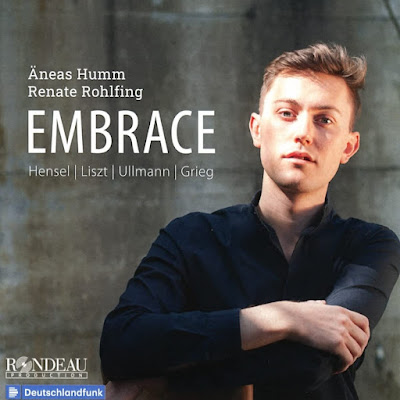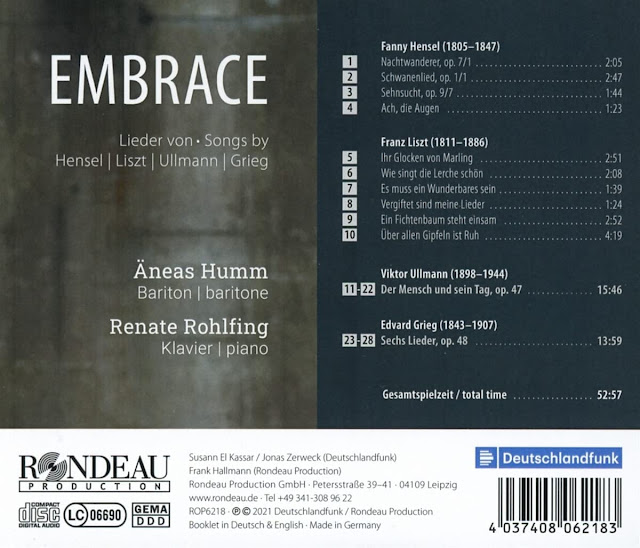Embrace: songs by Fanny Hensel, Franz Liszt, Viktor Ullmann, Edvard Grieg; Äneas Humm, Renate Rohlfing; Rondeau
Reviewed 12 August 2022 (★★★★½)
An imaginative programme from the young Swiss baritone in performances which show great beauty of tone allied to a feeling of really drawing you in
Swiss baritone Äneas Humm graduated from the Juilliard School of Music and last season was part of the ensemble at the Badisches Staatstheater Karlsruhe, and he will be part of the ensemble of the Theater St. Gallen in Switzerland from the 2022/2023 season. He has been nominated in three categories for this years Opus Klassik award. His debut recital disc, Awakenings, released in 2017, featured music by Viktor Ullmann, Richard Strauss, Hugo Wolf and Alban Berg.
Under the title Embrace, Äneas Humm's second solo recital, with pianist Renate Rohlfing, on the Rondeau Production label, features songs by Fanny Hensel, Franz Liszt, Viktor Ullmann and Edvard Grieg. All are settings of German texts, and all are in some way on the edge of the lieder repertoire; Fanny Hensel can be too often seen as simply the sister of the more famous Felix, Liszt's lieder have never quite achieved the fame of his other music, Viktor Ullmann remains one of the 20th century's undeservedly neglected composers whilst Grieg, though Leipzig trained, wrote songs somewhat at a tangent to the lied tradition.
In his booklet note, Daniel Ernst describes the disc's title as both as an "emphatic embrace that embodies a deep sense of human empathy in times of hope, fear, love and heartache, but equally reflects aspects of various circumstances in which our personal desire leads us to embrace opportunities and step out with confidence, allowing us to achieve the extraordinary."
We begin with Fanny Hensel. The four songs that Humm has chosen come from both Hensel's published and her unpublished songs. She began publishing in 1846; she was over 40 and it was still an act of some daring. She was supported in her composition by her husband, but her brother was more ambivalent and it is perhaps significant that these publications should be songs, suitable for private performance. What Humm and Rohlfing bring out is the sense that Hensel had a voice in her own right. Humm begins Nachtwanderer with a lovely warm, well-modulated tone with beautifully shaped phrasing. Throughout the disc, you keep coming back to his fine feeling for word and phrase, allied to superb diction and beautiful tone. He and Rohlfing really draw you in. Schwanenlied has a lovely immediacy of tone to it, with Humm displaying a fine mezza-voce at times. Sehnsucht is light and engaging, with a lovely sense of engagement, and then Ach, die Augen sind es wieder positively erupts, impulsive and vivid.
The Liszt group begins with Ihr Glocken von Marling, with a beautifully transparent chromatic piano introduction over which Humm gently floats the vocal line, creating something seductive and mysterious. Wie singt die Lerche schön again has that sense of magical texture, with the performers creating something engaging and impulsive. Es muss ein Wunderbares sein is something of a slow waltz, with Humm creating an engaging feeling of character, and then comes the dramatic Vergiftet sind meine Lieder. Ein Fichtenbaum steht einsam combines intense, dark tone with a sense of the drama in the narrative, and finally Über allen Gipfeln ist Ruh which opens with hushed beautiful tones from both performers that creates something quite miraculous. Both Humm and Rohlfing make you think about Liszt as a song composer, writing pieces that are far more than just curiosities.
Next comes Viktor Ullmann's cycle, Der Mensch und sein Tag. 12 short songs to texts by Hans Günther Adler(1910-1988). The songs were written in Theresientstadt and Adler likely wrote the aphoristic poems with an eye to his friend's setting them. The titles mix times of day and general concerns of human life, as if sketching an entire human life in a single day. All the songs are short, and Ullmann's piano parts are significant, there are postludes as long as the vocal sections themselves, and a sense of the voice and piano being different partners in a whole. Overall Ullmann's style is expressionist and Humm excels at bringing out the expressive lyrical qualities in the vocal lines. He and Rohlfing create a series of little character studies, each one expressively different moving between the vividly intense, the lyrically emotional and the quietly magical, whilst there is even a Kurt Weill-like march. Naturally, some seem to evoke Berg's songs as well, intense and dark. Throughout, performances are very communicative and give the cycle a very particular atmosphere, then in the final song, the quietly intense Stille, the two create something very special indeed.
Finally we reach Grieg's Six Songs, Op. 48 where the mature Grieg returns to German texts yet combines the lieder tradition with a sense of freshness from his Nordic background. 'Gruß' begins things in a perkily engaging manner, then 'Dereinst Gedanke mein' combines lovely speaking tone with a sense of story-telling. 'Lauf der Welt' has a strong whiff of folk influences to it, and Humm's tone is so engaged that you really feel his is talking directly to you, 'Ich liebe sie, sie liebet mich, doch keines sagt: ich liebe dich'. This feeling continues in 'Die verschwiegene Nachtigall' with a lovely intimate feel to it. The shapely phrases that begin 'Zur Rosenzeit' lead to something rather intense, and then finally 'Ein Traum' where the two draw you in towards the intense climax.
The disc comes with articles in both German and English, but unfortunately the song texts are only in German so you need to do some digging to find translations. Fortunately Humm's diction is both excellent in its clarity and highly expressive.
This recital is an imaginative look at the edges of the 19th and 20th century lieder tradition, allied to superb performances from Äneas Humm and Renate Rohlfing that really draw you in.
Fanny Hensel (1805–1847)
Nachtwanderer, op. 7/1
Schwanenlied, op. 1/1
Sehnsucht, op. 9/7
Ach, die Augen
Franz Liszt (1811–1886)
Ihr Glocken von Marling
Wie singt die Lerche schön
Es muss ein Wunderbares sein
Vergiftet sind meine Lieder
Ein Fichtenbaum steht einsam
Über allen Gipfeln ist Ruh
Viktor Ullmann (1898–1944)
Der Mensch und sein Tag, op. 47
Edvard Grieg (1843–1907)
Sechs Lieder, op. 48
Äneas Humm (baritone)
Renate Rohlfing (piano)
Recorded 1 to 4 February 2021, Sendesaal Bremen
RONDEAU PRODUCTION ROP6218 1CD [52:57]
Never miss out on future posts by following us
The blog is free, but I'd be delighted if you were to show your appreciation by buying me a coffee.
Elsewhere on this blog
- Matters of the heart: a warmly communicative journey through Schumann's Frauenliebe und -leben with Sarah Brady and Stephen Delaney - record review
- Operatic wit and style in the West End: Donizetti's Rita at the Charing Cross Theatre - opera review
- Colour and movement: Gilbert & Sullivan returns to Opera Holland Park with HMS Pinafore - opera review
- Prom 30: Gavin Higgins' Concerto Grosso for brass band and orchestra with the Tredegar Band and BBC NOW - concert review
- Two very different approaches to Bach's Goldberg Variations from harpsichordist Nathaniel Mander & violinist Jorge Jimenez - record review
- Stupendous achievement: Grimeborn's Ring adventure comes to a thrilling and satisfying conclusion at the Hackney Empire - opera review
- Vox in Bestia: Laura Catrani uses solo voice to explore Dante's animals with music from three contemporary Italian composers - record review
- A Vaughan Williams Anthology: Tony Cooper reviews Naxos' eight-disc box set - record review
- Black, el Payaso: Pablo Sorozábal's engaging operetta gets its UK premiere in an enterprising production by Cervantes Theatre at Grimeborn - opera review
- Handel’s Alcina - a ‘first’ for Glyndebourne - joins other great Handel gems in the company’s repertoire such as Ariodante, Giulio Cesare, Rinaldo and Theodora - opera review
- Finely poetic: Ernest Chausson's early Piano Trio alongside works by his contemporary, Eugene Ysaÿe - record review
- Riotous comedy & humanity: Donizetti's L'elisir d'amore at West Green House Opera - opera review
- Home













No comments:
Post a Comment